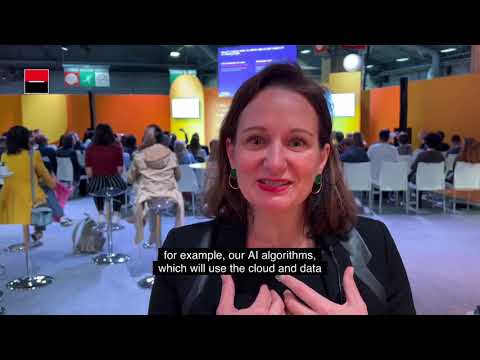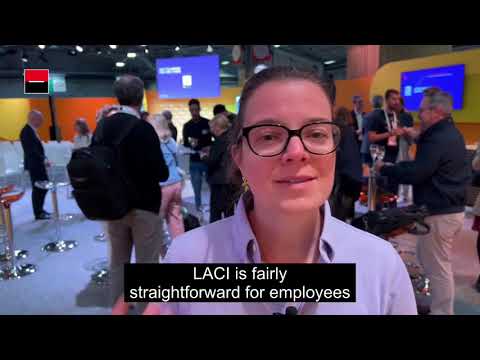VivaTech: meet our AI/Data experts
VivaTech, the major European event that “accelerates innovation by connecting startups, tech leaders, major corporations and investors”, took place in Paris from 22 to 25 May. A partner of the event, Societe Generale brought together more than 150 participants for a very instructive workshop devoted to responsible AI.

This year, VivaTech’s central theme was (inevitably) AI! Given the current craze for the Generative AI revolution, the latter was at the heart of discussions and represented, according to the organisers, 40% of the innovations presented by exhibitors.
Responsible AI, a competitive advantage in the financial services universe
Spotlight on the workshop organised by Societe Generale with Artificial Intelligence (AI) experts. The latter led a multi-focal workshop to look in greater detail at how responsible AI is genuinely becoming a competitive advantage in the financial services universe. Societe Generale presented its achievements and major developments in this area and invited experts to take part in the event such as the start-up namR, the benchmarker Evident AI Insights, the consulting firm Accenture.
Noémie Ellezam, the Group’s Head of Artificial Intelligence, introduced the workshop by explaining that “the AI transformation within Societe Generale is first of all a business-focussed transformation. It involves identifying the most strategic use cases for the bank and its businesses, rationalising processes and encouraging cooperation between various departments”.
Martina Machet, Deputy Head of Data Science for SGRF, reminded participants that the SG Bank’s strategy “focusses on smart content to free up time for its members of staff and improve operational efficiency and customer satisfaction”, adding that “the priority is to provide AI solutions guided by the Company’s requirements and ultimately fully used by staff. That’s why the test & learn approach is favoured and change management is the key to success”.
To the question “what is driving our AI transformation today”, Etienne Guibout, the Group’s Deputy Head of Artificial Intelligence, confirmed that “Societe Generale’s strategy with regard to AI is guided by value and responsibility. The early integration of Data and AI within our digital transformation in 2016 has helped us build a solid base of hundreds of use cases. This extensive experience has enabled us to acquire solid in-house expertise in the delivery and supervision of the use of these technologies”.
The need to acculturate employees
Societe Generale is in seventh place in the EvidentAI benchmark in terms of developing talent and in first place in terms of training and career development, leading Etienne Guibout to comment on these impressive rankings: “At Group level, we have developed a training path to acclimatise the entire company to Digital, Data and AI at every level. At the same time, we have made online training available with more than 5,000 certification courses in data science”.
Lastly, in VivaTech’s lively aisles, experts from Societe Generale and its partners took part in speed interviews. Watch their testimonies.

Chloé Clair at VivaTech 2024
In 1 minute, Chloé Clair, co-founder and CEO of namR, presents the uses of Artificial Intelligence within namR.
At namR, we produce data using artificial intelligence algorithms to characterise buildings from based on their morphology, context and environment.
And then we use AI algorithms to predict, to estimate the best transformation solution for these buildings so that they are viable in 2050.
For me, it's all about impact. All you have to do is compare the impact, for example, our AI algorithms, which will use the cloud and data centres, and the impact of our tools, for example at home, to help people make the transition to a greener home.
What we offer is our knowledge. Today, I know what the best solution is for the ecological transition in terms of decarbonisation and adaptation of any building in France.
I give this power to those who have the most leverage to reach out to businesses and individuals, i.e. banks, insurers and financial institutions to help everyone take action in favour of the environment, transforming buildings to make them viable in 2050.

Noémie Ellezam at VivaTech 2024
In 3 minutes, Noémie Ellezam, the Group’s Head of Artificial Intelligence, presents the uses of Artificial Intelligence within Societe Generale.
[Artificial Intelligence in finance, with Noémie Ellezam, Head of AI at Societe Generale group]
[What are the changes brought by generative AI and the widespread use of AI models in the financial world?]
Indeed, Artificial Intelligence at Societe Generale is not new. It's part of our digital strategy for a number of years already, with the first use cases that we have started to deliver in 2016, some of them even to scale, in areas such as payment fraud monitoring, for example.
We have already seen a real acceleration in 2019 linked to the maturity of technologies and therefore much greater value creation through our use cases.
But it's true that there's a new accelerating with the emergence of AI, particularly generative AI, that complement the technologies we already had, not least because, quite apart from the technological revolution that it represents a real revolution in usage, we're entering a world where AI is going to be a real force to be reckoned with on all the bank's processes, from the most standard to the most sophisticated.
We are in the process of moving beyond the use case approach and moving towards a much more holistic transformation of our processes and our customer journeys through Artificial Intelligence.
[How can these technologies be generalised?]
So yes, indeed, the whole challenge of transforming AI, this is what we call scaling up. To push us forward in this transformation, we have effectively set ourselves a target of 500 million euros in new business value from our portfolio of advanced data use cases and Artificial Intelligence by 2026.
We're well on the way to achieving this because we have already reached 430 million by the end of 2023.
This raised the issue of scaling up, it's less a technological issue than a question of how we integrate this AI throughout our corporate environment, and our existing processes, our existing value propositions, our regulations, etc
[How can we remain responsible and sovereign in the face of such change linked to AI?]
Responsible AI, is an interesting subject because it's multifaceted.
The OECD has set out nine principles of responsible AI, which show the extent of what is covered.
There are subjects that, as a banker, we've been familiar with it for a long time, which concern the supervision of models and the ability to explain them, and protecting the data used to drive these models.
These are subjects on which we are, of course, continuing to make progress and adapt.
And then there's a whole host of others. Subjects that also take shape in the magnitude of the AI transformation in this acceleration phase, such as how we operate AI with a positive impact and therefore with our ESG considerations, for example.
How can we, as bankers, do the same? We're supporting our French and European ecosystems so that we can build on in the future on AI solutions that are at least partially sovereign?
Or how about us, as a responsible employer of over 100,000 people worldwide, we are able to anticipate the impact on the transformation of our businesses and to support our employees in this transformation.

Martina Machet at VivaTech 2024
In 3 minutes, Martina Machet, Deputy Head of Data Science for Retail Banking, presents the uses of Artificial Intelligence within SG Retail Banking.
[LACI, the intelligent content assistant] with Martina Machet, Deputy Chief Data Science Officer at French Retail Banking, Societe Generale
LACI is a nice name we've come up with for the intelligent content assistant, referring to the LACI dog, which is very intelligent.
We developed this solution because we realised that today.., in French Retail Banking, it is quite complicated to find information in our internal document database.
Today, we already have things in place. In particular, there is a classic search engine that works by keywords. So, employees already have access to information. But actually, today it's a bit complicated.
It takes time because they will have a large list of documents and it's hard to find the document they're looking for in this list.
And then, once the document has been found, to be able to identify the right information within the document.
[How does LACI work?]
LACI is fairly straightforward for employees in the sense that the employee will have an interface with a search bar where users can ask questions.
And when it comes to generative AI, we tend to say "prompt". This means that the employee must write a question in natural language, trying also to contextualise the question as much as possible, which is quite different from compared to what we've been used to until now. And what LACI does behind it, is that it will query the internal document database, and via generative AI, in particular through Retrieval Augmented Generation, he can identify the places and paragraphs in the documents that will be able to answer the user's question.
It will use all these bits of document to generate a precise answer to the employee's question. As well as this, it will also display the documents and the bits of document it used to generate the answer.
[What about data confidentiality?]
Yes, of course. In any case, we're still driven by guaranteeing data confidentiality.
And indeed, we also chose this use case because in the French Retail Banking database, we tend to use data that is not very sensitive. So it was a good first use case, at least for generative AI. But it's true, even if it's not very sensitive data, we're still very concerned about the security of this data, how it is used, and to the technologies used in our solution.